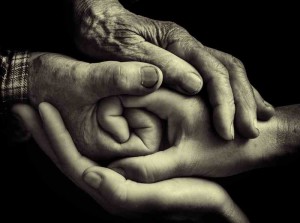Families Don’t
 When we talk about a disability community, what I think we’re really describing is a family of sorts. Much like family, very few of us actually chose this community as our own. We’d much rather be a part of the Easy Living On A Beach Somewhere Community, but this is the one we were handed, and we’re mostly stronger for it. The beach still sounds nice, but whatever. Those families are soft.
When we talk about a disability community, what I think we’re really describing is a family of sorts. Much like family, very few of us actually chose this community as our own. We’d much rather be a part of the Easy Living On A Beach Somewhere Community, but this is the one we were handed, and we’re mostly stronger for it. The beach still sounds nice, but whatever. Those families are soft.
The disability community in the Internet Age can be a thing to behold. We seek each other out, mostly from our starting points mired in deep solitude. If there’s one universal experience of special needs parents, it might be that initial feeling that we’re in this alone. For persons with disabilities, I imagine it’s even worse. Then we google, and we start to slowly build our tribe. I can imagine what it must have been like twenty years ago. And I can scarcely dream of what technological benefits and connects our community will enjoy twenty years from now.
Some of us have supportive families, others not so much, and to some extent we all go out and build onto that family with the friends in our lives who truly get it. But I really do think that it’s when we begin to make those deep online connections that those of us in the world of disability find our community. That’s especially true of more rare diagnoses like polymicrogyria, the brain malformation that Schuyler refers to as her little monster.
The thing about the disability community, like actual families, is that honestly, we’re not always very nice to each other. We criticize each other. We engage in petty jealousies. We even demonize each other, sometimes in the most dramatic, bridge-burning ways. (I’m looking at you, autism community. Seriously.) In some ways, we mistreat each other in the same way we mistreat our actual families because like those families, it takes some truly apocalyptic bad behavior to separate ourselves for long. The things that bring us together as a community don’t go away. There’s a permanence to membership that isn’t easy dissolved.
We as members of the disability community (particularly in our little immediate families of similar diagnoses) can be pretty hard on each other, it’s true. There are some things we don’t do, however, not if we value the human connections we’ve made. We don’t lie to each other about our diagnoses or those of our kids or loved ones. We don’t prey on each other. We don’t commit fraud on those seated in our same boat. We don’t use the fragility of our fellow tribe members for our own personal gain. We don’t break each others’ hearts if we can avoid each other. We just don’t. Even vampires don’t bite each other. Surely we can live up to that standard, at least.
For me, the Internet-based disability community is like a big, mostly loyal but unpredictable dog. It is usually helpful and mostly of great comfort. Every now and then, though, it turns and it bites.
Note: To support the site we make money on some products, product categories and services that we talk about on this website through affiliate relationships with the merchants in question. We get a small commission on sales of those products.That in no way affects our opinions of those products and services.


Sometimes I think we feel compelled to act horribly toward those to whom we’re closest–including the bonds of community and shared experience–partly because, as you say, it takes a *lot* of bad behavior to get them to leave you alone for a while (even when you want them to!), and partly because the betrayal and pain of discovering a critical difference is amplified when you’re looking for/counting on solidarity. I think I treat people worst when I feel like I can’t (a) easily get rid of them or (b) differ from them with impunity. It kind of sucks, actually.